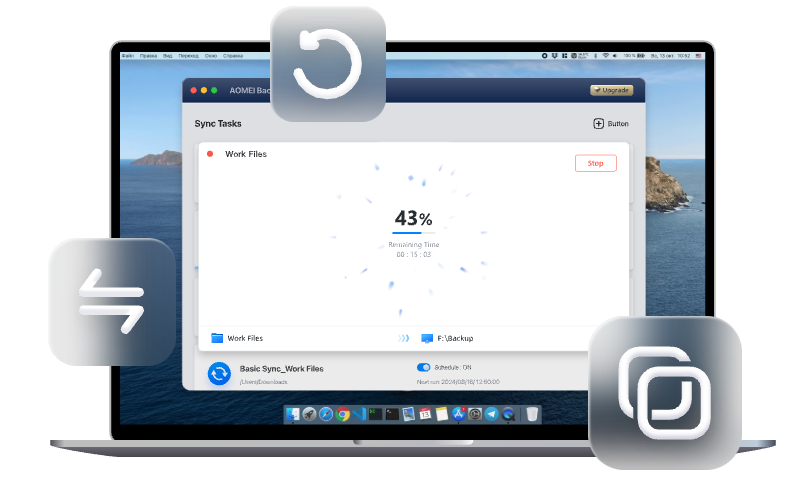How to Fix Outlook for Mac Not Syncing Automatically Guide
This comprehensive guide tackles the frustrating issue of Outlook for Mac not syncing automatically. You'll find detailed solutions, from simple settings adjustments to more advanced troubleshooting methods. We'll also introduce a robust syncing solution to safeguard your data.
Microsoft Outlook not Syncing on Mac Email Automatically
“It appears this update occurred today. Since the update, Outlook will not automatically bring in email (push setting) and must be manually synced each time. I have found no settings to help fix this. This stopped working concurrently with the update.”
– Answers.Microsoft
The Reasons Why Microsoft Outlook 365 Mac not Syncing
There can be various reasons why Microsoft Outlook 365 on a Mac might not sync properly. Here are some common issues:
⚡Internet Connection Problems: If your internet connection is unstable or weak, Outlook may have trouble syncing emails and other data.
⚡Outdated Software: Using an outdated version of Outlook or macOS can cause compatibility issues and hinder syncing.
⚡Server Issues: Problems with the email server can prevent Outlook from syncing properly. This might be due to server maintenance, outages, or incorrect server settings.
⚡Corrupt Profiles: A corrupted Outlook profile can lead to synchronization issues. Creating a new profile might resolve the problem.
⚡Add-ins or Plugins: Certain add-ins or plugins installed in Outlook can interfere with the syncing process.
By addressing these issues, you can often resolve syncing problems with Microsoft Outlook 365 on a Mac. If the problem persists, consider reaching out to Microsoft Support for further assistance.
How to Fix Outlook for Mac not Syncing Automatically
Experiencing trouble with Microsoft Outlook not syncing automatically on your Mac can be quite frustrating. This issue can disrupt your workflow and make it difficult to stay up-to-date with your emails and calendar events. However, don't worry! There’s no need to panic, as this is a common problem that can often be resolved with some basic troubleshooting steps. Here’s a simple guide to help you troubleshoot and resolve this problem step-by-step, ensuring your Outlook stays in sync and you remain productive.
Method 1: Check Work Offline Mode
1. To start, launch the Outlook application on your Mac.
2. Check the top menu bar for an option labeled "Work Offline."
3. If there's a checkmark next to it, it means this mode is currently enabled.
4. Click on "Work Offline" to disable it.
5. Afterward, see if your emails and other items begin to sync correctly.
Method 2: Rebuild Outlook for Mac File
If there's an issue with the Outlook for Mac database, you might experience problems with Outlook for Mac not syncing automatically.
1. First, ensure all Outlook-related applications are closed.
2. Make a backup copy of the Outlook Identities folder on your computer's C drive.
3. Next, open Outlook while holding down the Alt key to launch the Microsoft Database Utility.
4. In this utility, select the identity you want to repair and click the Rebuild button to reconstruct that identity.
5. Wait patiently for the process to complete.
Method 3: Clear Cache Data
When cache files become corrupted or incomplete, it can cause issues such as unexpected application crashes and power outages. To resolve this, it’s best to remove unsynchronized cache files. Here are the steps to follow:
1. Right-click on the problematic folder and select "Properties."
2. In the Properties dialog box, choose the "Empty Cache" option.
Bonus: Mac File Sync Software Without Data Loss
After resolving the automatic synchronization issue in Outlook, consider using a robust sync tool to protect your data. AOMEI Backupper Mac is an excellent choice for backing up and syncing your files. Its intuitive interface and powerful features simplify file protection. With AOMEI Backupper, you can sync your data efficiently and reliably, ensuring your information is always secure.

- Sync Everything on Mac: Ensure comprehensive protection by syncing any files on your Mac.
- Variety of Sync Options: Choose from Basic Sync, Mirror Sync, or Two-Way Sync for diverse synchronization needs.
- Multiple Destinations: Sync files to local drives, NAS devices, external hard drives, USB flash drives, SD cards, and more.
- Fast and Secure: Enjoy high-speed file syncing with advanced technology, ensuring encrypted and secure transfers.
Step 1: First, download and install the AOMEI Backupper Mac software on your computer. Open the program and click on "New Task" to begin.
Step 2: Select the synchronization type that fits your requirements. Mirror Sync or Two-Way Sync are great options for keeping two folders in sync.
📌Basic Sync: This method copies files from one place to another without removing the originals from the source location.
📌Mirror Sync: With Mirror Sync, an exact replica of the source files is created at the destination. It also deletes any files at the destination that are no longer present in the source.
📌Two-Way Sync: Two-Way Sync ensures both the source and destination locations stay updated. Any changes made in either location are synchronized to keep them identical.
Step 3: Pick the source folder and the destination where you want the synchronization to occur.
Step 4: Adjust the sync schedules and any other settings according to your preferences.
You can customize how often your files synchronize—options range from once, hourly, daily, weekly, to monthly. You can also set the start time and choose whether the system should hibernate or shut down after syncing completes.
In the Options menu, you can fine-tune the synchronization process by specifying which files and folders to include or exclude. This flexibility allows you to tailor the sync to your specific needs and preferences.
Step 5: Once you’ve configured all the settings, hit the "Sync" button and wait for the process to complete.
FAQs About Outlook for Mac Not Syncing Automatically
Q 1: How can I check if my Outlook account settings are correct?
A 1: Go to Tools > Accounts in Outlook for Mac, select your email account, and verify that the incoming and outgoing server settings match those recommended by your email provider.
Q 2: What should I do if updating Outlook doesn't fix the syncing issue?
A 2: If updating doesn't help, try clearing the Outlook cache. Close Outlook, navigate to the cache folder via Finder and delete the cache files before reopening Outlook.
Q 3: Will clearing the Outlook cache delete my emails?
A 3: No, clearing the cache will not delete your emails. It only removes temporary files. Your emails and other data will be re-downloaded from the server.
Tips for Preventing Syncing Issues in Outlook for Mac
Regular Updates: Keep Outlook and your macOS updated to the latest versions to avoid compatibility and performance issues.
Stable Internet Connection: Ensure you have a reliable internet connection, as network issues can disrupt email syncing.
Backup Regularly: Use tools like AOMEI Backupper to regularly back up your data, safeguarding against data loss and ensuring you can quickly restore your files if issues arise.
Conclusion
Dealing with Outlook for Mac not syncing automatically can be a significant disruption, but with the solutions provided in this guide, you can effectively resolve the issue and restore smooth email management. Whether adjusting account settings, updating software, or clearing the cache, each method is designed to address the common causes of syncing problems. By maintaining regular updates, a stable internet connection, and consistent backups, you can prevent future syncing issues and ensure a seamless Outlook experience.

